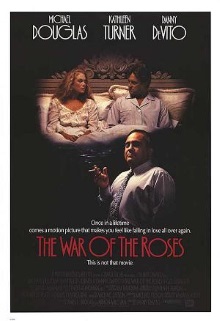
This marks the last of the selections for the Marriage and the Movies course which is due to start next week. It’s actually a relief because while the course picked movies that I never would have watched otherwise and might well have pedagogical value in the context of what the professor will be trying to teach, they aren’t exactly great movies. This one, which was directed by Danny DeVito and in which he appears as a supporting character, is another example in this vein of decent but not really outstanding films.
Oliver and Barbara Rose, played by Michael Douglas and Kathleen Turner, are the ultimate yuppie couple. After meeting, falling in love and marrying as young students, they reach the stratified heights of the American elite thanks to his Washington DC lawyer career and her behind the scenes support. They have fancy cars, a live-in maid, a huge McMansion, two chubby kids who go to Harvard. The whole nine yards. But then as the kid prepare to leave, Barbara has an identity crisis over what she is living for and gets fed up with Oliver’s overbearing ego. She asks for a divorce, he gets angry at what he thinks is her lack of gratitude and they have a huge fight over it, hence the “war”.
This would be a pretty humdrum story, save that it’s played for humor rather than drama. Both leads are great too, with Turner’s character being especially fun. It’s essential to this formula that the couple aren’t actually trying to physically hurt one another. It’s funny because they’re like little kids trying to get one-up on the other in a contest of egos. That’s also why this movie has Barbara being the stronger and more physically dominant of the two, explained here by her having a background as a gymnast. In this movie, this is perfectly symbolized by having Barbara drive a huge 4×4 monster truck while Oliver drives a tiny, classic Morgan.
Unfortunately to get to the funny parts you also need to put up with DeVito shamelessly showcasing himself. It’s understandable that a movie like this needs a frame story with a third-party narrator, but DeVito takes way too much delight on filming himself recounting the story of the Roses to a young man who comes to him to ask for legal advice about his own divorce. He’s the least interesting part of the movie and its length could probably be cut down by fifteen minutes if you omitted his scenery chewing and moralistic finger-wagging.
There are some enjoyable moments in this movie, and the climax feels like a precursor of the domestic total war scenario of Home Alone with a grim twist. But it’s take on marriage and divorce feels dated, with a strange lack of attention being paid to the children. Overall, it’s just one of those movies that are okay to watch but probably not worthy enough to warrant getting it out of the archives.